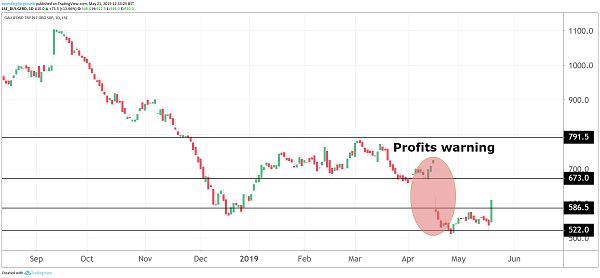High-yielding Galliford Try shares blast higher
The shares are dirt cheap, but a 13% yield shows investors want rewarding for holding this risky stock.
21st May 2019 12:58
by Graeme Evans from interactive investor
The shares are dirt cheap, but a 13% yield shows investors want rewarding for holding this risky stock.

Building stocks don't come any cheaper than Galliford Try (LSE:GFRD), which is why today's reassuring update from a company boasting a dividend yield of 13% is so intriguing.
The shares have been trading with a price/earnings (PE) multiple of just 4x after an arduous period of construction overruns and the saga of the Aberdeen road bypass scheme, which led to a £150 million rights issue in early 2018.
The most recent blow came last month when Galliford said plans to reduce the size of its construction business would knock up to £40 million from annual profit forecasts.
Shares subsequently fell to a seven-low year of just above 500p, although that's been partially reversed after today's update contained no more bad news on current or legacy contracts. The construction division is now being shrunk by about 10% and refocused towards building, water and highways projects, with a target of achieving operating margins of 2% by 2021.
With the company also reporting a resilient performance for housebuilding division Linden Homes, and continued strong progress for its Partnerships and Regeneration business, the shares rallied 13% to over 600p.

Source: TradingView Past performance is not a guide to future performance
They had been below their 2018 rights issue price of 568p after falling 14% in the year to date, compared with a 14% rise for the wider sector so far in 2019.
Even at today's improved level, analysts at Liberum think the stock is looking "extremely undervalued" based on its target price of 865p. Peel Hunt also sees upside to 700p, although it admits that medium-term uncertainty on construction profitability will continue to make investors nervous. Its forecasts are based on a negative £120 million value for construction.
This division recorded a negative profit margin of 2.7% in the company's most recent half-year results, whereas Linden achieved an improved 19.6% in the same period. The construction arm's biggest troubles relate to rising cost estimates on the Queensferry Crossing near Edinburgh and the Aberdeen bypass after the collapse of partner Carillion.
Chief executive Graham Prothero, who was promoted from finance director in March, said the company had taken some difficult decisions in relation to the construction challenges.
While a blend of low PE and high dividend yield is not uncommon among housebuilding and construction stocks, Galliford's declining share price means that the stock now trades with a forward dividend yield of 13%.
A dividend policy of two-times earnings cover meant February's interim pay-out was cut by 18% to 23p after September's annual award fell 10% to 77p. Liberum expects this year's annual dividend to be reduced to 69p before rising 3p in each of the following two years.
They said that the stock market had been too harsh in April by treating the company's £40 million construction downgrade as value destruction, rather than factoring in the potential benefits of restructuring.
The broker added in a note:
"The shares trade at under 1x book value, which ignores the fact that Partnerships and Regeneration helps give the housebuilding activities a higher than average return on capital employed."
The company said consensus forecasts for annual profits were between £112.7 million and £123.3 million, compared with £156 million prior to April's profit warning.
These articles are provided for information purposes only. Occasionally, an opinion about whether to buy or sell a specific investment may be provided by third parties. The content is not intended to be a personal recommendation to buy or sell any financial instrument or product, or to adopt any investment strategy as it is not provided based on an assessment of your investing knowledge and experience, your financial situation or your investment objectives. The value of your investments, and the income derived from them, may go down as well as up. You may not get back all the money that you invest. The investments referred to in this article may not be suitable for all investors, and if in doubt, an investor should seek advice from a qualified investment adviser.
Full performance can be found on the company or index summary page on the interactive investor website. Simply click on the company's or index name highlighted in the article.